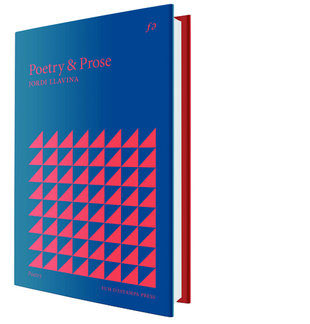Interview
Douglas Suttle
Translator and publisher
Scratching a little deeper

“The idea is to show that Catalonia’s a very good source of high-quality writing” “We’re going to do six books a year, but this may expand”
“UK and US readers are prepared to read more in translation” “We’re reading in Catalan and talking to Catalan writers and translators”
Douglas Suttle, a Londoner, studied History and Archaeology at university. After working in the wine import business in England, he moved to Vilafranca del Penedès some 10 years ago and worked at first in the wine export business: “I wasn’t so good at selling wine as buying it, though.” More broadly, he wanted to experience a new land and was drawn to Catalonia by the spread of Greek culture through the Mediterranean.
Now he supports himself by teaching and translating while setting up Fum d’Estampa Press, dedicated to publishing books in translation from Catalan to English. Michael Eaude talked to him by Skype.
Why the name, Fum d’Estampa?
It’s hard to come up with a name. One day Jordi Llavina, the poet who features in two of the books we’re publishing this year, mentioned he’d once been on a radio programme with that name. I liked the sound of it, a little bit enigmatic – and we wanted a Catalan name, which would be attractive in English.
Nice name but what does it mean?
It’s difficult to translate, which is one of the reasons I like it. It’s the ’smoke’ or dust that came off the metal blocks of type that were used in the old printing presses.
You must get fed up with people telling you how ridiculous, or over-ambitious, the idea of setting up a press translating literature from Catalan to English is. Is there a market?
Compared with a decade ago there are a lot of small presses in the UK and USA publishing literature in translation. Readers are certainly prepared to read more in translation. We think there’s a market. We hope there is.
Certainly since Frankfurt in 2007 there have been a lot more translations from Catalan. A lot of the classics: Rodoreda, Sagarra, Joan Sales etcetera have come out. I was surprised you didn’t start with bigger names than your first two authors: Poetry & Prose by Jordi Llavina and English Hours by the historian Ferran Soldevila (reviewed on previous pages).
We have a slightly privileged position, in the sense that we have our feet on the ground here in Catalonia. Though our business is based in the UK, I and the other two partners live and work here. This means that we can scratch a little deeper than other publishers, who depend on recommendations from writers or translators. They tend to go for the big guns and it is utterly deserving that the most famous Catalan writers are being translated. But we’re reading in Catalan and talking to Catalan writers and translators. There are a lot of good and varied books. For instance, we’re publishing Andrea Victrix, a dystopian novel by the Mallorcan Llorenç Villalonga, Jaume Subirana’s The Silent Letter (originally ’La hac’ – the letter H in Catalan), La resistència intima by Josep Maria Esquirol and The Others by Raül Garrigasait. In general, we work with authors who are very interesting but go under the radar.
You’re going to educate a lot of people.
We want to show how rich and powerful Catalan culture is. This country punches above its weight in terms of quality art, including literature.
I do agree that Catalonia’s quality of painting and writing is out of proportion with its small population and oppressed language. Though, at times, I find myself writing something like ’Josep Pla is the equal of any modernist writer of the 20s and 30s’… and I wonder, but is that really true? I don’t know enough about other European, let alone world cultures. Isn’t it just special pleading?
I know exactly what you mean. What can I say? The only criterion is the book has to be good. It’s not enough to have people here happy that our publications are generating interest in Catalonia itself. ’Goodness me, how wonderful,’ they swoon. But while that might sell a few books here, the great British or American public don’t care that much. First and foremost, the book has to be great. And that’s the idea, to show people that Catalonia’s a very good source of high-quality writing.
Why do you say Catalan literature punches above its weight?
Clearly in terms of the rich language and quality art it produces. In another sense, the costs of promoting a book here, I think, are lower and the business is not as cut-throat as in Britain. Hence, there are a lot of incredibly daring publishers in Catalonia.
It’s also a very subsidised book culture, because of its being a minority language and so on. I’m not at all against that, but there’s an argument that too much is getting published in Catalan.
Yeah, as in any language, a lot of weaker stuff is published. But Catalan publishing houses can afford to take risks on books that in the UK are overlooked. Someone has taken a risk and I’m lucky because I can draw on these bold publishers and pick up innovative, exciting, risky books like Josep Maria Esquirol’s philosophical essay. I can say, this book is important, so should be in an English-speaking market.
Jordi Llavina’s long poem and story and Ferran Soldevila’s diaries are your first two books, out in July. Why did you choose them?
Jordi Llavina is a friend. At one level his poem, The Hermitage, is an account, a physical and metaphysical account, basically of a man walking up a hill, but it ticks quite a few boxes, touches on many different subjects, food, flora, fauna, and it also represents an awful lot of Catalan culture. It’s an epic poem and I love it. The Soldevila, I read and thoroughly enjoyed. I was caught by one of the things that Alan Yates says in his introduction – the book allows us “to see ourselves as others see us.” It’s also a direct two fingers up to Brexit and the way things were going in the UK. It’s humbling, quite funny, beautifully written. You know, there are things you think are completely normal when you live in the UK, but when you leave you find that they’re not normal at all. I asked for the rights and found it had been translated by Alan Yates in the 1970s but never published. Alan was amazed when I told him I wanted to publish it. He’d done the translation, as he says, per amor a l’art.
And after these two?
Right now, we’re going to do six books a year, but this may expand. We’ve got a 300-page selection of Joan Maragall’s poetry, translated and edited by Ronald Puppo, out in November – mostly poetry, but some prose. And I myself translated Narcís Oller’s The Madness.
Maragall and Oller – so you have got Catalan classics!
Yes, I don’t think Oller has ever been translated. This one was difficult to translate. It’s full of what would be termed ’barbarismes’ now, turn-of-the-century Catalan, and he uses very long sentences and long-winded descriptions.
Did you cut the sentences down or did you preserve them?
A bit of both really. It’s about finding the right balance and making it accessible to English-speaking readers, but without losing sight of where it comes from.
The translator’s dilemma, isn’t it? Be faithful to the original or make it better – or more accessible.
It’s a good book, about a very specific time. It deals with Barcelona and rural culture, it takes in the Carlist Wars. It talks about ideas of insanity – how should people with mental difficulties be treated? Punished? Locked away? There’s excellent dialogue between the main characters on how people saw mental illness in the 19th century. It gets across how different Catalonia is from Spain, too. And the writing’s great.
interview
Leave a comment
Sign in.
Sign in if you are already a verified reader.
I want to become verified reader.
To leave comments on the website you must be a verified reader.
Note: To leave comments on the website you must be a verified reader and accept the conditions of use.

